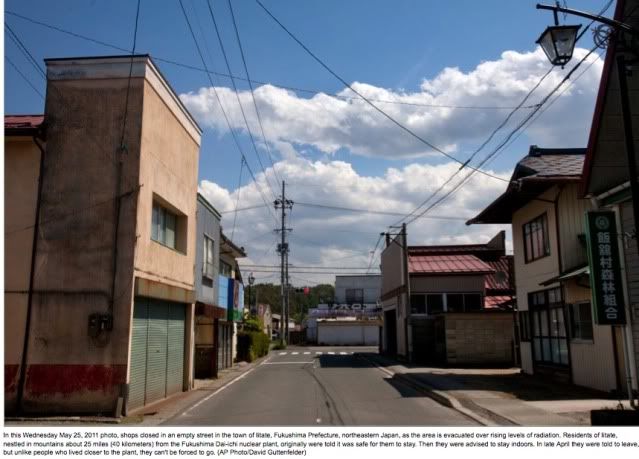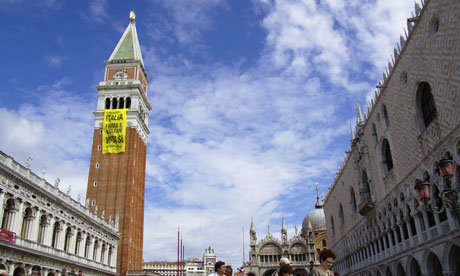Japanese village's nuclear reality sets in slowly
By ERIC TALMADGE, Associated Press – 1 day ago
IITATE, Japan (AP) — Her village is irradiated, but Shigeko Nikaido says she isn't going anywhere.
She's got an 88-year-old mother to take care of, and a little business that means everything to her. Until someone comes and physically kicks her out, she says, she's staying put.
Nikaido is among about 1,500 people who still haven't left Iitate, a scenic village of 6,200 where the reality of Japan's nuclear disaster took a painfully long time to become clear. Though the rest of Japan — outside of the disaster zone itself — has largely returned to normal, Iitate is just now in the process of emptying out.
Residents of Iitate, nestled in mountains about 25 miles (40 kilometers) from the Fukushima Dai-ichi nuclear plant, originally were told it was safe for them to stay. Then they were advised to stay indoors. In late April they were told to leave, but unlike people who lived closer to the plant, they can't be forced to go.
Plans were to have everyone out last week. Now, officials say it's largely up to residents to decide what to do.
"I'm not going to leave just because they tell me to," Nikaido said outside a small farmers' market.
Others are resigned to joining 80,000 other "nuclear refugees" but fear they will never come home.
"It's an order, so what can you do?" said vegetable farmer Mineo Sato, 55. "I've lived here all my life. I doubt if I'll ever come back."
To the casual visitor, Iitate appears normal.
The village, a blink-and-you've-missed-it cluster of farms and houses along a local highway, was virtually untouched by the March 11 quake. Because it is well inland, it was never threatened by the tsunami, which caused horrific devastation along the coastline.
The post office on its main street is still open, and so is the gas station. Dogs bark, birds chirp and the fields and hills are a verdant green — just like they are in the posters that boast Iitate is one of Japan's "100 Most Beautiful Villages."
But upon closer inspection there are signs that all is not right.
The elementary school playground is deserted. Outside the village hall, moving companies have set up stalls to solicit business. Trucks sit beside centuries-old farmhouses as whole neighborhoods pack up to leave.
Japanese media reported that Iitate's oldest resident, a 102-year-old man, was so distraught over the idea of leaving that he killed himself after being told of the evacuation plan. Town officials will not confirm his cause of death.
The village was outside the official danger zone, which extended out to just 12 miles (20 kilometers) from the plant, but it was in the path of a plume of radioactive isotopes the nuclear power station spewed into the air.
The first sign of trouble in Iitate came March 21, when the Health Ministry advised residents not to drink tap water because of elevated levels of iodine.
Then, on March 31, the International Atomic Energy Agency announced that radiation substantially higher than levels at which the U.N. nuclear agency would recommend evacuations had been recorded in Iitate.
The village's milk, produce and soil have all since tested at dangerously high levels of contamination.
The produce and milk exceeded government health regulations, though consuming them in small quantities is not seen as immediately health-threatening. The bigger concern, and the rationale for the evacuations, is the impact of being exposed to relatively high ambient radiation over an extended period of time.
On April 22, the central government expanded its evacuation zone to include Iitate and four other towns, adding about 10,000 people to the legions of nuclear refugees.
The town's leaders were given one month to prepare to get the villagers out, but the pace of the evacuation has been slower than expected.
By May 31 the village announced more than 4,700 residents — including thousands who left on their own — had relocated. About 20 percent of Iitate's pre-disaster population remained, but Iitate officials say they have no legal basis to punish anyone refusing to obey the order.
"We had hoped to have the evacuation finished by the end of May, but we can't threaten those who stay or force them to go," said village official Kazuki Imai. "It's now up to them, and they are here on their own responsibility."
The village office itself is scheduled to set up operations in a different town on June 22.
Many of the holdouts are farmers, for whom the evacuation has been especially life-changing. Because they can't take their animals with them, dairy and pig farmers have been forced to put their livestock up for auction, or put them down.
"We live off the soil. It's hard for us to simply leave our land," said Sato, the vegetable farmer, as he picked some flowers in his garden and prepared to leave. "I don't doubt that it's dangerous here, but it's hard to go."



